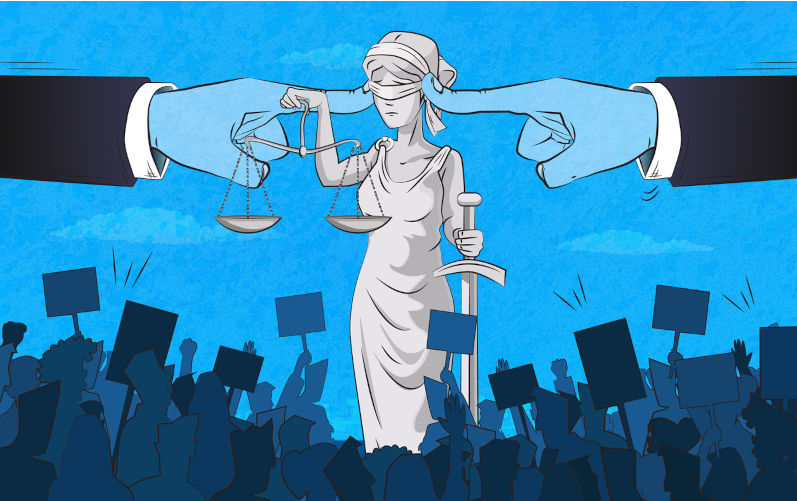International law not only abused – but abandoned
July 30, 2025
As the world watches the destruction of Gaza unfold in real time, the legitimacy of international law faces a crisis more profound than any it has seen since its post-WWII codification.
The issue is no longer simply that the law is being abused – it is that it is being rendered irrelevant. When war criminals are not only unpunished but continue to lead powerful nations, when mass atrocities are met with rhetorical condemnation but no meaningful action, the law itself begins to collapse under the weight of its own hypocrisy.
The most acute case in our time is Israel’s ongoing military campaign in Gaza. As of mid-2025, tens of thousands of Palestinian civilians have been killed, entire neighbourhoods reduced to rubble, and essential infrastructure — hospitals, schools, water networks — intentionally targeted or indiscriminately destroyed. Leading international human rights organisations, UN agencies and respected legal scholars have described the situation as a genocide in progress.
Social media have documented events in real time. One of the most harrowing was a recent video from Gaza: an elderly man who managed to reach the front of a food queue, collapsed and died on the spot.
And yet, nothing changes.
The International Court of Justice has found that there is a “plausible case” that Israel is committing genocide, a finding reinforced by South Africa’s legal filing and subsequent orders for provisional measures. But Israel has not complied, and powerful states, especially the US, have blocked any mechanism of enforcement. Even the International Criminal Court’s recent warrants have been met not with respect but open defiance with US lawmakers threatening to sanction the very judges tasked with upholding international law.
The West’s commitment to international law is deeply selective. The invasion of Ukraine by Russia in 2022 was rightly condemned as a violation of the UN Charter and a war of aggression. Yet when Israel, a close ally of the West, repeatedly violates the same legal principles, including the prohibition against collective punishment, targeting of civilians, and annexation of occupied land, the response is tepid, conditional or delayed.
In fact, instead of upholding international law, the US has actively worked to shield Israel from accountability. It has vetoed multiple UN Security Council resolutions calling for ceasefires or investigations. It continues to provide military aid and intelligence support. It pressures allies in Europe and the Global South to avoid any steps that would isolate or penalise Israel. And it even undermines multilateral institutions like the ICC when they threaten to hold its partners to the same standards as its adversaries.
This double standard is not merely a moral failure – it is a structural one. It reveals that international law is not functioning as law at all, but as a geopolitical instrument deployed selectively by those with power.
What is the point of legal norms if they are not enforced? Genocide, war crimes and crimes against humanity are not abstract terms – they are crimes defined under international treaties to which most of the world’s states are signatories. But without enforcement, they become rhetorical tools rather than legal obligations.
The enforcement of international law relies on political will, particularly from powerful states. But when those states are the ones committing or supporting the crimes, the system fails.
The global public sees this, especially in the Global South. The belief that the West upholds a “rules-based order” has become increasingly difficult to sustain. While Western leaders speak of democracy, justice and the rule of law, they simultaneously arm, fund or protect regimes that systematically violate those principles. This erosion of credibility risks long-term damage to the very idea of international cooperation.
Despite this bleak landscape, there are possible practical steps that can restore integrity to international law. For example, international legal institutions must be insulated from political interference. The ICC, in particular, needs not only financial support, but legal protection from punitive actions by powerful states. Judges and prosecutors must be allowed to do their work without fear of retaliation.
The UN Security Council needs reform. The veto power held by five permanent members has made enforcement of international law impossible in cases involving their allies. Expanding the Security Council and limiting the use of the veto in cases of mass atrocity could break the paralysis.
More countries can and should adopt laws allowing their courts to prosecute individuals for war crimes and genocide, regardless of where the crime occurred or the nationality of the perpetrator. This has precedent – in 1998, Spain issued an arrest warrant for Chile’s Augusto Pinochet, sparking a global conversation on accountability.
The global legal community, along with civil society organisations, must continue to document, advocate, and litigate – relentlessly. While enforcement may be slow or blocked, the historical and legal record must be preserved. Truth itself is a form of resistance.
States that claim to value human rights must be willing to impose meaningful costs — economic, diplomatic or military — on those who commit war crimes. This includes suspending arms sales, ending trade preferences and enforcing sanctions against individuals responsible for atrocities.
I dare say that the world is watching Gaza not just as a tragedy, but as a test. If international law cannot protect Palestinian civilians from obliteration in full view of the global community, then it cannot protect anyone. The erosion of legal norms in one place becomes a precedent elsewhere.
This is not just about Gaza. It is about whether humanity still believes in law over force, rights over might and justice over silence.
If international law is to mean anything, it must apply to all – not just to the weak and defeated, but to the powerful as well.
The views expressed in this article may or may not reflect those of Pearls and Irritations.

